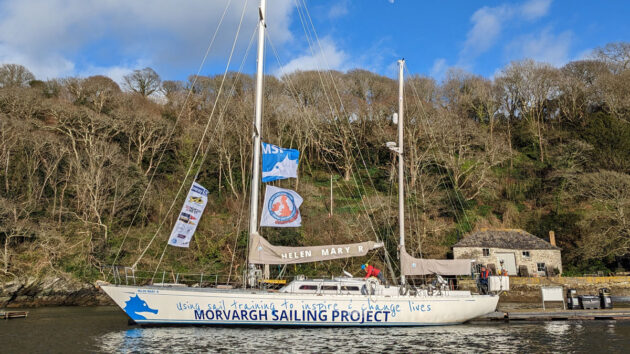Sail training providers across the UK are warning the cost of proposed changes to the Maritime and Coastguard Agency’s (MCA) Sport and Pleasure Code of Practice’ could have a ‘devastating’ impact on the services they deliver.
The new MCA Sport and Pleasure Code of Practice aims to meet the rapidly changing needs of the small commercial vessel sector used for sport or pleasure, and sets out the legal and safety requirements.
The MCA is now reviewing responses following a 12-week consultation period. The Ellen MacArthur Cancer Trust was among the sail training providers to urge supporters to have their say and ‘help protect the future of our sailing adventures.’
The Ellen MacArthur Cancer Trust said in a statement: “While we support safety improvements, some changes could bring significant costs – limiting how many young people we can help.”

The Ellen MacArthur Cancer Trust inspires young people aged 8-24 to believe in a brighter future living through and beyond cancer. Credit: Martin Allen Photography
Key concerns surrounding the Sport and Pleasure Code of Practice (among other points) the Ellen MacArthur Cancer Trust is asking the MCA reconsider are:
- Definition of ‘crew’ – young people on the Ellen MacArthur Cancer Trust trips are by sail training definition ‘trainees’, in that they have no legal safety responsibilities.
The charity is advocating for the removal of the word ‘trainees’ from the revised definition of ‘crew’, plus adding ‘trainees’ to the code text where appropriate or required, to ensure the status quo remains, avoiding additional training requirements and costs.
- The proposed requirement for a crewmember to wear a personal locator beacon (PLB) equipped with GPS and a light should be a ‘recommendation’ and that in a man overboard (MOB) situation, the priority should be everyone on board is alerted – to keep eyes on the MOB – rather than prioritising a land station.
The requirement would mean choosing just one crewmember to wear it, or the prohibitive cost of equipping all lifejackets with this equipment.
- Regarding new certification, the Ellen MacArthur Cancer Trust strongly believes a stability reassessment at 20 years should not be required unless there is a change in the area or category of operation or modifications to the vessel.
Of the four vessels the Ellen MacArthur Cancer Trust owns, one (Moonspray) is over 20 years old. The proposed changes in the examination regime and stability reassessment would make her financially unviable.

Helen Mary R sails best with teamwork, communication and resilience, on deck and below
The Morvargh Sailing Project, which provides youth development opportunities for young people aged 11-plus aboard its Bowman 57 yacht, Helen Mary R, from Fowey, Cornwall, has also raised concerns.
A spokesman said: “The proposed changes fail to reflect the realities of running a small sailing vessel. Instead, they appear to be directly adapted from the Workboat 3 regulations designed for tugs and workboats, poorly suited to small commercial vessels.”
Cumulative effect
“The reality is that the cumulative effect of multiple new requirements places a significant strain on small organisations.
The compliance costs add up quickly, and the risk is very real for an organisation like Morvargh Sailing Project, which operates on tight budgets and limited reserves.
Some of these changes could make it financially impossible for us to continue operating.”

The Morvargh Sailing Project, which operates on tight budgets and limited reserves, helps young people become more confident, more resilient, more motivated and better able to communicate though volunteer-led, life-changing sail training voyages
In reference to the new Sport and Pleasure Code of Practice, a Royal Yachting Association (RYA) spokesman said: “We support the need to update the existing codes of practice to reflect evolving standards, address key Marine Accident Investigation Branch (MAIB) recommendations, and accommodate alternative propulsion types.
“However, we urge the MCA to allocate sufficient time to thoroughly review and respond to the feedback from this public consultation.”
A MCA spokesperson said: “There is now a greater range of vessels undertaking a wider scope of activities than previous iterations of the small commercial vessel codes can reasonably and safely regulate, and the MCA will always work to ensure there is proper regulation that is up to date and fit for purpose.
“Our aim is to support the industry to thrive and innovate.”
Ben’s story: The Ellen MacArthur Cancer Trust
Four year's after undergoing surgery and treatment for a brain tumour, sailing has boosted Ben Baldry's confidence
New AIS MOB device rule affecting sailors
Big changes to marine radio device rules are planned to be brought into the UK. The only MOB AIS devices…
How to go sailing and boating if you don’t own a boat
From tall ships to small dinghies, you don't need to own a boat to go sailing. Ali Wood looks at…
Want to read more news articles?

A subscription to Practical Boat Owner magazine costs around 40% less than the cover price.
Print and digital editions are available through Magazines Direct – where you can also find the latest deals.
PBO is packed with information to help you get the most from boat ownership – whether sail or power.
-
-
-
- Take your DIY skills to the next level with trusted advice on boat maintenance and repairs
- Impartial in-depth gear reviews
- Practical cruising tips for making the most of your time afloat
-
-
Follow us on Facebook, Instagram, TikTok and Twitter







